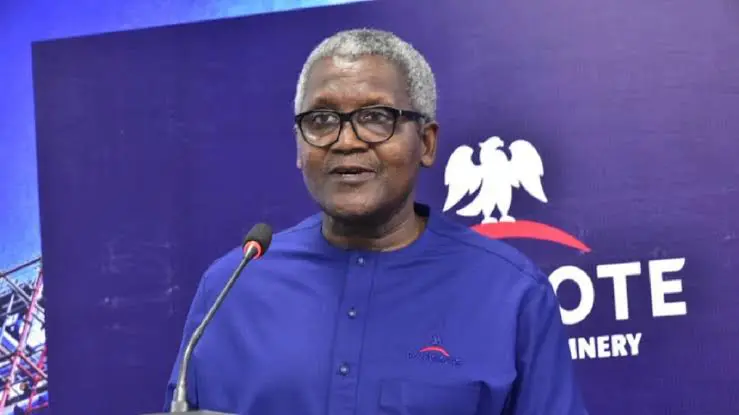Foreign exchange losses and the Securities and Exchange Commission’s decision to deny the merger proposal of the Dangote Group, which comprises Dangote Sugar Refinery and NASCON Allied Industries, have been blamed for the recent decline in the stock prices of the company.
The persistent pressures on inflation and volatility in the foreign exchange market, according to analysts, have made these problems worse. The cost of importing raw materials has gone up due to the naira’s depreciation, further compressing profit margins, according to The Punch.
From May to August 2024, Dangote Sugar Refinery’s stock plummeted by 18.67 per cent from N45.00 to N36.60, on the back of disruptions in the supply chain and volatile sugar prices, which have adversely affected the company’s financial performance. NASCON Allied Industries experienced a downturn in its stock price, falling by 12.57 per cent from N37.00 to N32.45 over the same period. However, Dangote Cement achieved a 41 per cent growth in its share price from May to August 2024, rising from N419 in May and reaching N591 by early August.
A statement dated and signed in April by NASCON’s company secretary, Adedayo Samuel, announced the suspension of the proposed merger between Dangote Sugar Refinery Plc and Dangote Rice Limited.
He further said that this decision, which was first made public on August 30, 2023, will not move forward in light of the Securities and Exchange Commission’s remarks and suggestions, which raised issues with Dangote Rice Limited’s existing non-operational condition. NASCON thanked its stakeholders for their ongoing assistance.
“NASCON Allied Industries Plc. (“NASCON”) at this moment notifies the Nigerian Exchange Limited and the investing public that, further to its announcement of August 30, 2023, in respect of the proposed merger of Dangote Sugar Refinery Plc, NASCON and Dangote Rice Limited, a decision has been taken to suspend the said merger at this time.
He said “The suspension is due to the comments and recommendation of the Securities and Exchange Commission centred around the current non-operational status of Dangote Rice Limited. NASCON wishes to express its appreciation to all its stakeholders and will keep the public informed of any developments as they arise.”
A shareholders’ advocacy group leader, Bisi Bakare, stated that while Dangote Group’s subsidiaries have faced declines, they are actively seeking growth opportunities and resilience.
“I do not think the refinery is playing any role in it. It has to do with similar challenges facing the manufacturing sector.
“One of the challenges is the effect of foreign exchange losses, which arose as a result of the continuous depreciation of the naira.
“Also, inflationary pressures, which arose as a result of a continuous increase in inflation, led to a high interest rate on borrowing, which has an untold effect on finance costs and bottom line. Also, the high cost of raw materials imported and the high cost of energy. All these factors continue to impact on manufacturing sector of which Dangote Cement isn’t an exception,” she said.
A financial analyst, Ariyo Olugbosun blamed the drop on the Securities and Exchange Commission rejecting a merger that Dangote Sugar, NASCON, and Dangote Rice Limited were proposing.
He contended that the stock price swings were made worse by the regulatory decision, which caused a decline in investor interest.
“While FX losses are a concern, the SEC’s decision on the merger has been a major driver behind the fluctuating stock prices. The SEC decision is best known to them, but I think it would have helped Dangote make more profit,” Olugbosun explained.
Commenting on this development, the President of the Progressives Shareholders Association of Nigeria, Boniface Okezie emphasized that market forces were primarily responsible for the swings, noting that this viewpoint highlights broader patterns impacting the industry as a whole rather than simply specific companies.
“The trend is not unique to Dangote Cement alone. If you look at other companies in the cement industry, like BUA Cement and Lafarge, you’ll see similar patterns. Despite the challenges, Dangote Cement remains higher in value compared to its peers, with BUA Cement following closely.”
Regarding Dangote’s much-anticipated refinery project, Boniface noted that its performance cannot be assessed at this time, as it is not yet a publicly quoted company, emphasizing the need for swift action to prevent further damage to the oil and gas industry.
“The refinery isn’t fully operational, and until it is, we can’t gauge its market strength,” Boniface explained. They added that ongoing issues with the Nigerian National Petroleum Corporation (NNPC) and other regulatory bodies are hampering progress. “Nigeria stands to lose if the regulatory relationships aren’t quickly resolved.”
According to Boniface, the possible effects on foreign investment, are also a cause for concern. He issued a warning that unresolved matters would discourage investors from doing business with Nigeria.










